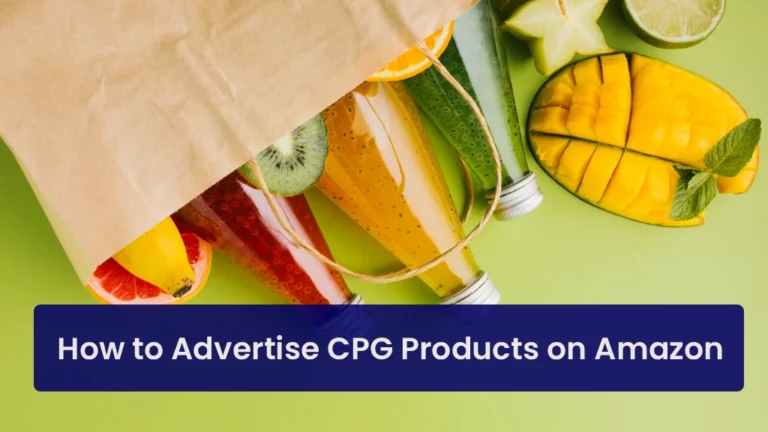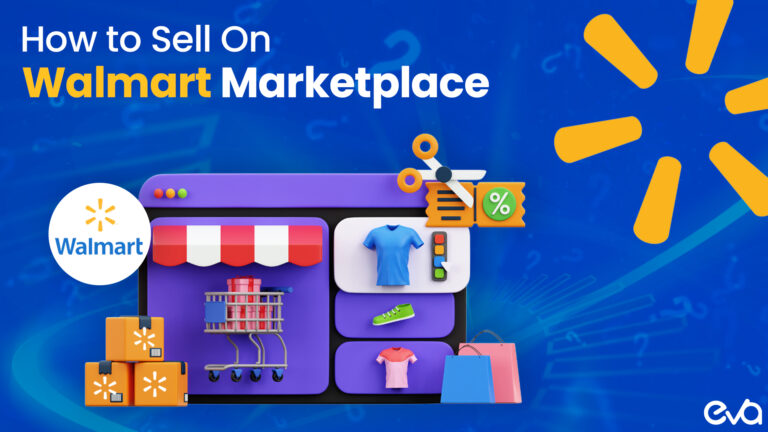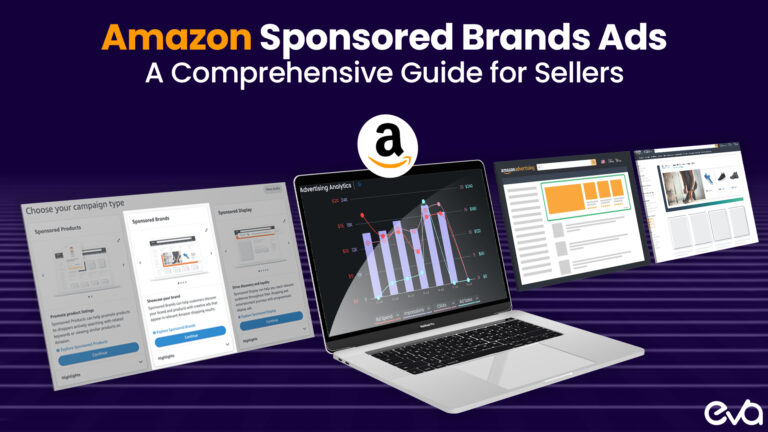In the high-stakes world of e-commerce, Prime Day has evolved into a critical event that can make or break a brand’s annual performance.
As Amazon’s Prime Day 2024 approaches, the pressure mounts for e-commerce sellers to not only meet but exceed sales targets and gain significant visibility.
The competition is fierce, and the risk of missing out on this golden opportunity is all too real.
Imagine pouring resources into preparation only to see your competitors outshine you, capturing the lion’s share of the market.
The pain of lost revenue and missed growth opportunities can be daunting. But there’s hope.
This comprehensive guide will help you navigate Prime Day with confidence, highlighting key dates and effective strategies for various business models can enhance your success and ensure you stay ahead of the competition.
Table of Contents
What is Prime Day?
Prime Day is Amazon’s annual shopping event exclusively for Prime members, offering significant discounts on a wide range of products.
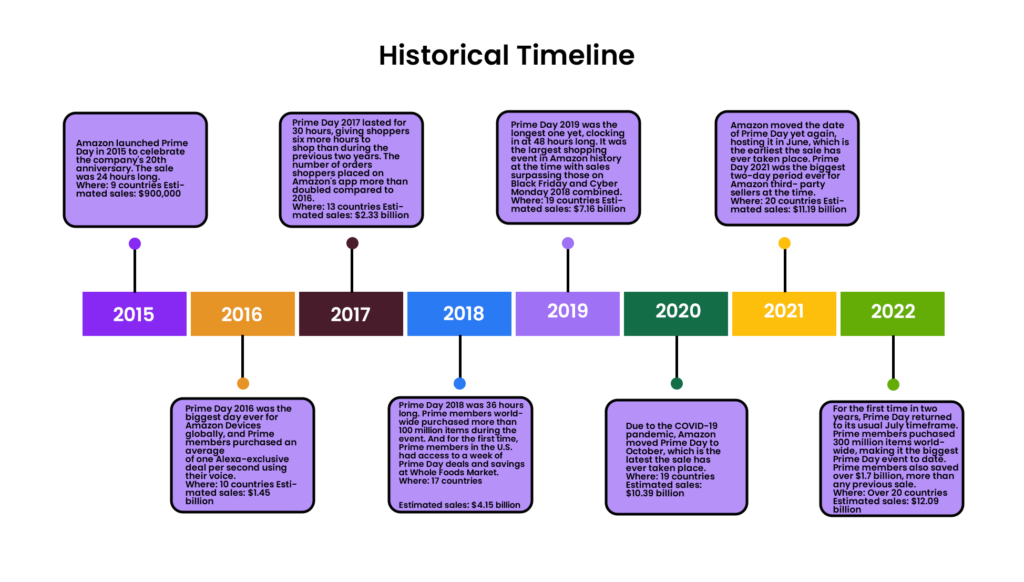
Originally launched in 2015 to celebrate Amazon’s 20th anniversary, Prime Day has grown into a global phenomenon.
It typically lasts for 48 hours, featuring lightning deals, limited-time offers, and significant markdowns across various categories.
Key Dates for Prime Day 2024
Prime Day is one of the most crucial events for Amazon sellers, and meticulous planning is essential to maximize the opportunity.
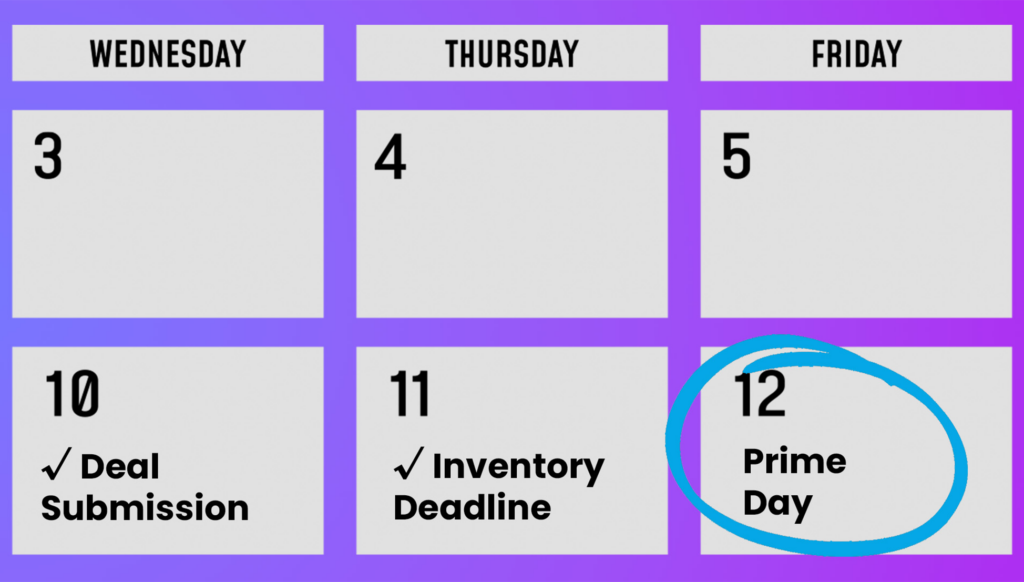
While Amazon has not yet officially announced the exact dates for Prime Day 2024, historical patterns suggest that the event will likely take place in mid-July.
Here are some critical dates and phases you should keep in mind to ensure you’re well-prepared for the big event:
Preparation Phase: May – June
This is the period when you should start getting everything in order. The preparation phase is all about laying the groundwork to ensure a smooth and successful Prime Day.
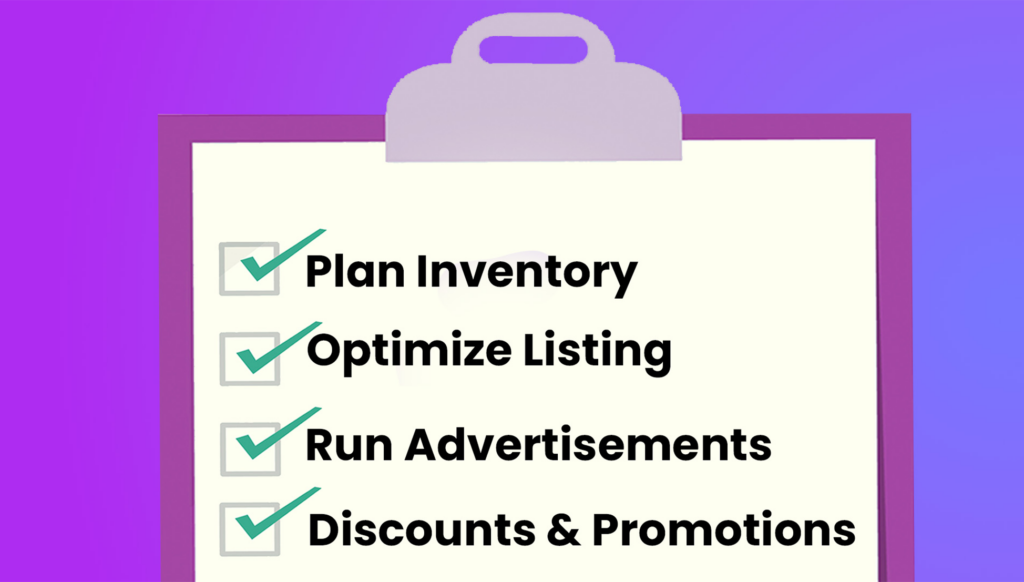
During this time, focus on the following tasks:
- Inventory Planning: Analyze past sales data to forecast demand accurately. Ensure you have enough stock to meet the expected increase in orders without overstocking.
- Listing Optimization: Review and enhance your product listings. High-quality images, detailed descriptions, and relevant keywords are essential for improving visibility and conversion rates.
- Marketing Strategy: Develop your marketing plan, including social media promotions, email campaigns, and influencer partnerships to build anticipation.
- Ad Campaigns: Start planning your Amazon PPC campaigns. Identify keywords, set budgets, and create compelling ad creatives.
- Pricing Strategy: Decide on discounts and promotions. Competitive pricing can help attract more customers during Prime Day.
Deal Submission Deadline: Early June
To participate in Prime Day promotions, sellers must submit their deals to Amazon for approval. This typically happens in early June. Here’s what you need to do:
- Submit Deals: Propose your lightning deals, best deals, and other promotional offers through Amazon Seller Central.
- Compliance Check: Ensure that your deals comply with Amazon’s guidelines and requirements to avoid rejection.
- Approval Process: Monitor the approval status of your deals and be prepared to make necessary adjustments if requested by Amazon.
Inventory Deadline: Late June
Having the right inventory levels is crucial for Prime Day. Amazon usually sets an inventory deadline to ensure that products are in their fulfillment centers and ready to be shipped quickly.
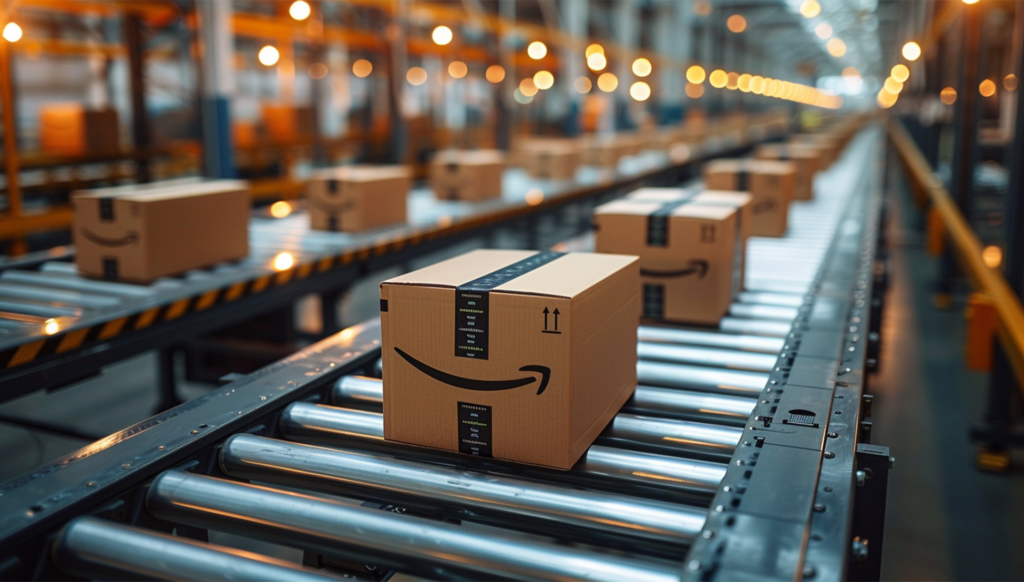
Important steps include:
- Final Inventory Shipment: Send your inventory to Amazon’s fulfillment centers by the deadline to avoid stockouts during Prime Day.
- Stock Monitoring: Continuously monitor your stock levels and consider sending additional shipments if needed.
- Buffer Stock: Maintain a buffer stock to account for unexpected demand spikes.
Prime Day Event: Expected Mid-July

The main event typically spans 48 hours, with continuous promotions and lightning deals driving intense traffic and sales. Key actions during this period include:
- Monitor Performance: Keep a close eye on your sales performance, ad campaigns, and stock levels in real-time.
- Adjust Strategies: Be ready to tweak your ad bids, budgets, and promotional strategies based on live data and performance analytics.
- Customer Service: Ensure that your customer service team is prepared to handle the increased volume of inquiries and orders efficiently.
- Leverage Promotions: Utilize social media and email marketing to highlight your Prime Day deals and drive more traffic to your listings.
Staying Updated
Amazon’s Prime Day dates can vary slightly each year, so it’s crucial to stay updated with Amazon’s announcements and notifications.
Regularly check Amazon Seller Central and subscribe to Amazon’s seller newsletters to receive timely updates and important information.
By adhering to this timeline and focusing on strategic preparation, you can position your e-commerce brand for a successful Prime Day 2024.
Strategies for Different Business Models
Private Label Sellers
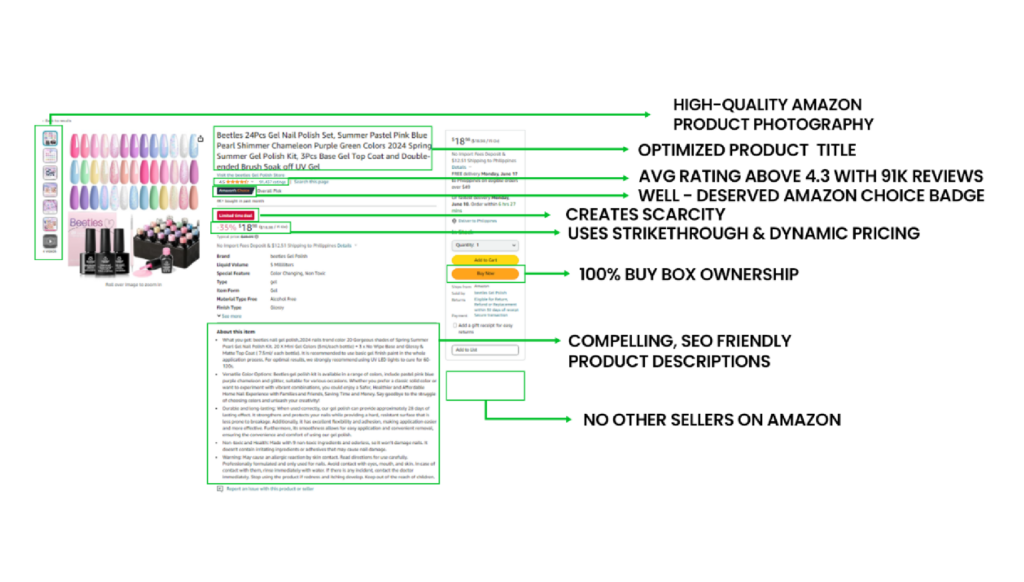
Private label sellers own and sell products under their own brand. Here are tailored strategies for maximizing success on Prime Day:
- Optimize Listings: Ensure your product listings are fully optimized with high-quality images, detailed descriptions, and relevant keywords to improve visibility and conversion rates.
- Stock Up: Analyze historical sales data to predict demand and stock up accordingly. Running out of stock during Prime Day can lead to missed sales and a loss of ranking.
- Competitive Pricing: Offer competitive pricing and consider running exclusive Prime Day discounts. Utilize Amazon’s repricing tools to stay competitive.
- Leverage Amazon Advertising: Increase your ad spend leading up to and during Prime Day. Sponsored Products, Sponsored Brands, and Sponsored Display ads can help drive traffic to your listings.
- Promotions and Coupons: Utilize Amazon’s promotional tools like coupons and lightning deals to attract more customers.
Brand Sellers
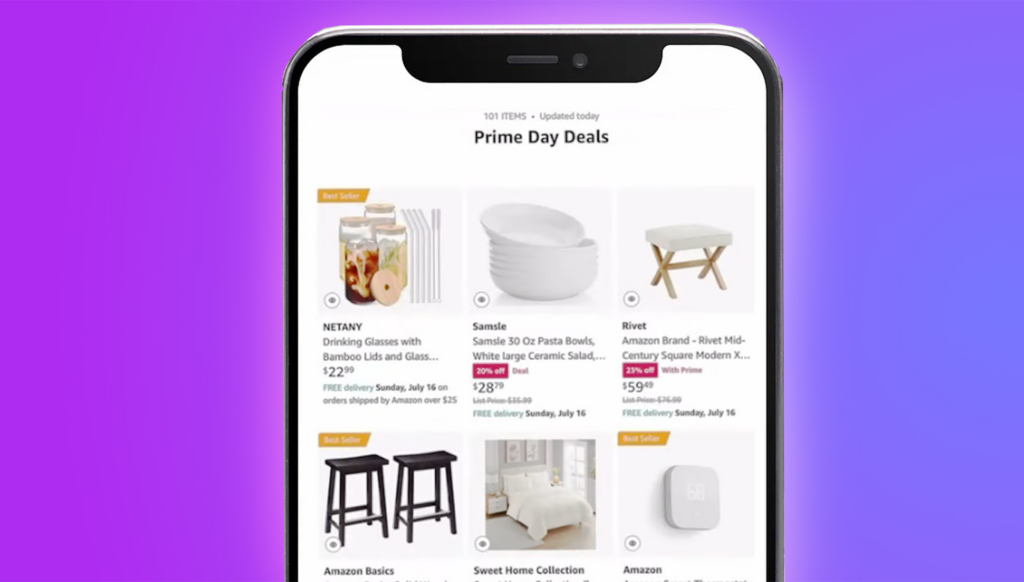
Brands that sell their own products on Amazon can benefit from these strategies:
- Brand Storefront: Make sure your Amazon Storefront is visually appealing and easy to navigate. Highlight Prime Day deals prominently.
- Enhanced Brand Content: Utilize A+ Content and Amazon Posts to showcase your products and engage customers with rich, informative content.
- Influencer Marketing: Collaborate with influencers to create buzz around your Prime Day deals. Influencers can help drive traffic and boost sales.
- Email Marketing: Use your email list to notify customers about upcoming Prime Day deals and exclusive offers.
- Review Strategy: Encourage satisfied customers to leave reviews leading up to Prime Day. Positive reviews can significantly impact purchase decisions.
Agencies
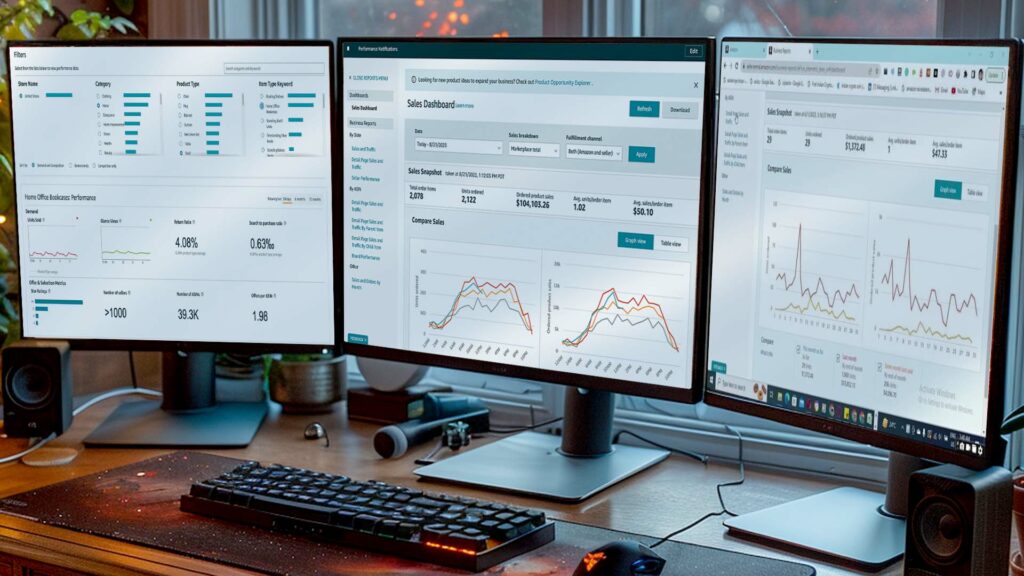
Agencies managing multiple client accounts should adopt a strategic approach to ensure all their clients succeed:
- Client Communication: Keep clients informed about Prime Day preparations, deadlines, and best practices. Regular updates ensure everyone is on the same page.
- Tailored Campaigns: Develop tailored advertising campaigns for each client based on their product offerings and target audience.
- Performance Monitoring: Use real-time data to monitor performance during Prime Day. Be ready to adjust bids, budgets, and strategies on the fly.
- Cross-Client Insights: Leverage insights from different clients to identify trends and apply successful tactics across multiple accounts.
- Post-Event Analysis: Conduct a thorough post-Prime Day analysis to evaluate what worked and what didn’t. Use these insights to improve future campaigns.
Unlock Your eCommerce Potential Today
Ready to take your online business to the next level? Try Eva’s powerful AI-driven platform free for 15 days—no credit card needed!
Looking for tailored assistance? If you need specialized support, our agency services and complimentary logistics solutions are designed to propel your brand forward.
Conclusion
Prime Day 2024 presents an unparalleled opportunity for e-commerce brands to boost their sales, acquire new customers, and enhance their brand visibility.
By understanding the key dates and implementing tailored strategies for different business models, you can maximize your Prime Day success and drive significant growth for your Amazon business.
Don’t miss out on the benefits these strategies can bring to your Prime Day preparations.
Start your free trial with Eva today and unlock the full potential of your Amazon business.
Frequently Asked Questions
Prime Day is an annual shopping event exclusively for Amazon Prime members, offering significant discounts and deals across various product categories. It typically spans 48 hours and features thousands of deals.
The exact dates for Prime Day 2024 have not been announced yet. Historically, it occurs in mid-July, but it’s best to keep an eye on Amazon’s announcements for the official dates.
To prepare for Prime Day, ensure your inventory is well-stocked, optimize your product listings with high-quality images and compelling descriptions, plan your marketing strategy, and consider running promotions or discounts to attract more buyers.
Prime Day features a wide range of deals, including Lightning Deals, Deal of the Day, and Best Deals. Discounts can be found across all product categories, including electronics, fashion, home goods, and more.
Small businesses can benefit from increased visibility and sales during Prime Day by participating in the event, offering competitive deals, and leveraging Amazon’s marketing tools. Highlighting unique or niche products can also attract more customers.
Yes, Amazon often provides special programs for sellers during Prime Day, such as promotional support, enhanced advertising options, and the opportunity to be featured in curated Prime Day collections.
If you run out of stock, communicate with your customers transparently about restock dates. Ensure your listings are updated, and consider offering pre-orders or back-in-stock notifications to maintain customer interest.
To stand out, focus on creating eye-catching product listings, offering competitive pricing, utilizing Amazon’s advertising tools, and providing excellent customer service. Additionally, unique promotions or bundling products can attract more attention.
Yes, participating in Prime Day can be highly beneficial for new sellers. It provides an opportunity to increase brand awareness, gain new customers, and boost sales. Proper preparation and strategic marketing can maximize these benefits.
Measure the success of your Prime Day promotions by tracking key metrics such as sales volume, revenue, traffic to your listings, conversion rates, and customer acquisition costs. Analyzing these metrics will help you understand the impact of your efforts and plan for future events.



